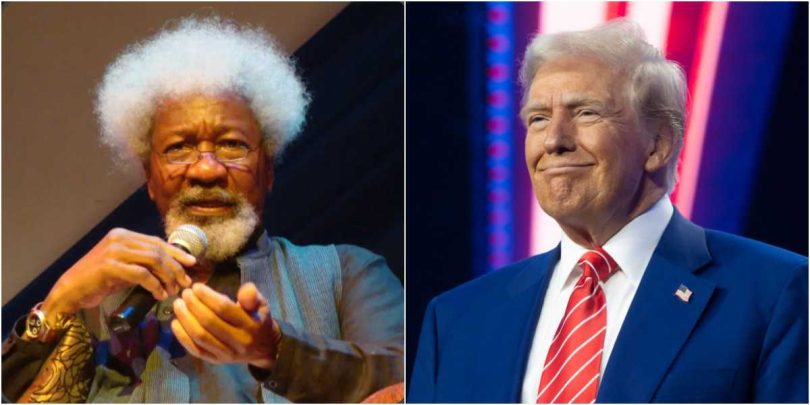Nobel Laureate and renowned writer, Professor Wole Soyinka, has reacted to the permanent revocation of his United States visa by American authorities, describing the decision as unnecessary and expressing suprises.
Speaking during a media parley at Freedom Park in Lagos on Tuesday, Soyinka explained that the revocation followed his refusal to attend a visa revalidation interview requested by the U.S. Consulate.
The literary icon revealed that he had torn his American green card shortly after President Donald Trump assumed office, describing it as a personal protest against what he viewed as divisive and discriminatory leadership.
Since then, he had been travelling to the U.S. using a B1/B2 visa.
On October 23, 2025, Soyinka received another letter from the consulate asking him to appear in person so that his visa could be officially stamped as “cancelled permanently.”
He, however, refused, saying: “If they wish to cancel it, that is their business. I will not go there to help them do it.”
Commitment to Hospitality
Despite the revocation, Soyinka emphasized that he would not allow the decision to affect his relations with American visitors.
“I will continue to welcome any American to my home if they have anything legitimate to do with me,” he said.
Recounting Past U.S. Experiences
The Nobel Laureate recounted two earlier incidents with U.S. authorities, both of which he described as minor misunderstandings that did not constitute criminal activity.
The first occurred many years ago at an American airport when Soyinka carried a few spicy chilli peppers from the United Kingdom. Upon arrival, airport officials discovered the peppers during a routine search and fined him $25 for failing to declare them.
“The officials were just doing their job,” Soyinka said, laughing. “It was a harmless mistake I simply forgot to declare the chilli I had carried from London.”
The second incident took place in the 1970s at Chicago Airport, when Soyinka confronted an immigration officer who had made a racist remark.
The situation drew police attention but was later resolved with the intervention of the late Chief Emeka Anyaoku, then Secretary-General of the Commonwealth.
“I do not think those two incidents are enough to classify me as having a criminal record in the United States. They were simply misunderstandings that could happen to anyone,” Soyinka stated.
Reflections on U.S. Relations
Soyinka stressed that aside from these isolated moments, he had maintained cordial relations with the U.S. for many years, which were only affected by the political climate under Trump’s administration.
He concluded by urging people worldwide to stand against discrimination and injustice, emphasizing the dangers of silence in the face of prejudice:
“Silence in the face of prejudice is as dangerous as the act itself.”

